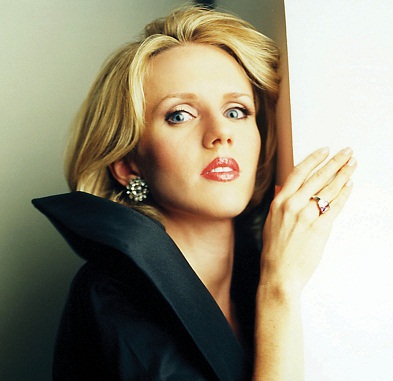Talent and Resolve
Wednesday, December 8, 2010

Stacy Boge Photography
Rejected by Juilliard. Sarah Coburn, an OSU alumna and operatic soprano with a stage voice like liquid gold, can put it on her résumé.
In addition, she can add that, as Bajazet’s daughter Asteria, she shared the stage with Spanish tenor Placido Domingo during a 2009 production of Tamerlano with the Los Angeles Opera. She soared as a soloist in Handel’s Messiah with the Seattle Symphony Orchestra and in the title role of the Cincinnati Opera’s production of Lucia de Lammermoor. And those are just a few snapshots of a year that took her from Cardiff, Wales, to Los Angeles, Calif.
By the way, The Huffington Post called her “stunning” and “stellar.” The Cincinnati Enquirer, “breathtaking.” “Luminous,” states the Financial Times.
Juilliard or not, Coburn’s young career is taking off.
“It’s a great school, absolutely,” she says, in an interview from her home in Greenwich, Conn. “But, no, you do not have to go to Juilliard. Save your money and stay home. I would’ve been lost in the crowd and totally intimidated at Juilliard in New York City.”
Coburn grew up in Muskogee, a small manufacturing town in northeast Oklahoma. Her father, 1970 OSU alumnus and Republican U.S. Sen. Tom Coburn, is a physician there. She spent her childhood growing up around family in the close-knit community and attending OSU football games with her parents.
She came to OSU in 1995 because of its music education program and her family connections to the university that include grandparents, great uncle, cousins and a sister. Her mother, 1970 alumna, Carolyn Denton Coburn, is a former Miss OSU. Coburn says she always wanted to be a Kappa Alpha Theta sorority member at OSU like her mother, sister and aunts. So naturally, her whole family, packed with talented musicians, was ecstatic about her decision to study music education at OSU.
“I think OSU has a fantastic music school,” says Coburn, who graduated in 1999. “When I was there, the faculty challenged me, and I thought the curriculum was academic and competitive. It could hold up against any conservatory out there.”
She praises her OSU professors, including her voice and chorale instructors, Julie McCoy, now at Texas Wesleyan, and Julie’s husband, Jerry McCoy, now at the University of North Texas. The two inspired her to love what she sang and exposed her to new repertoires.
“She has, and did from the beginning, a truly beautiful voice — just one of those voices that really comes along very rarely,” says Julie McCoy, who also notes Coburn has an innate understanding of music that makes her a good musician as well. “That kind of a combination in a singer is rare.”
The life of an opera singer can be hectic. Sometimes Coburn has to memorize 250 pages of music in a few days. The OSU program’s theory and analysis courses help her during crunch time, as does what she learned from other instructors, including Tom Lanners, Brant Adams and Gerry Frank.
“I’ve seen many, many of my friends who’ve gone to very reputable conservatories but have less knowledge of musical basics,” she says. An OSU background “helps your enjoyment of an art form when you understand the way it’s constructed. You can enjoy it regardless of performance.”
continues
Since she graduated, she has been all over the nation, married in 2008 to a consultant with Oracle, and had her first child, Katie Rose. Between being a singer, new mother and a wife, her life doesn’t allow much time to make it back to Stillwater, she says, and some opera assignments can last as long as seven weeks, such as her trip to Cardiff last summer.
But she was on campus last January for a performance with OSU’s Allied Arts series. She told a master class that while some success in music is due to talent, it’s mostly due to perseverance.
“A lot of really talented people give up, and there are a lot of average singers making a great living because they stuck it out,” she says. “In this business, you get rejected much more than you get accepted. You have to have a thick skin about it. You never know why companies decide they’re not going to hire you or have no desire to listen to you. It just happens to everybody.”
That persistence comes in part from her stubborn nature, she says, but she also attributes it to the seed Julie McCoy planted when she encouraged her protégée to audition with Larry Keller at Oklahoma City University. The new graduate was getting ready for a job interview at an Edmond elementary school.
“I had applied to several — lots of them, actually — big, important music schools, conservatories, and didn’t get into any of them. So, I thought, ‘Well, that’s obviously not meant to be.’”
However, she took McCoy’s advice, and the rest is history. Keller honed her on-stage performance craft and, thanks to a bit of luck, some hard work and no small amount of expensive vocal lessons and rejections, some great opportunities came along.
She ended up in New York City anyway, but it wasn’t to attend Juilliard. While she was finishing her master’s degree in voice with Keller, she was a national grand finalist in the 2001 Metropolitan Opera National Council Auditions in New York City. She would move there in 2002 after an apprenticeship with the Seattle Opera.
Since then, there have been too many highlights for her to remember them all, but a big one was singing with Placido Domingo. These days, she’s considering pulling back a bit so she can spend more time being a wife and a mother, and she admits it’s a struggle balancing work with enjoying her life.
“So many things have been great, and I’m very thankful. It’s one of the most fun careers. It can be crazy at times, exhausting and lonely,” she says. “But I feel very blessed to do what I do. I get to play dress up and sing beautiful music with an orchestra and play pretend on stage for a living. I have many things to be thankful for.”
A lot of really talented people give up, and there are a lot of average singers making a great living because they stuck it out.
I’ve seen many, many of my friends who’ve gone to very reputable conservatories but have less knowledge of musical basics.
This story originally ran in the 2010 College of Arts & Sciences magazine.

